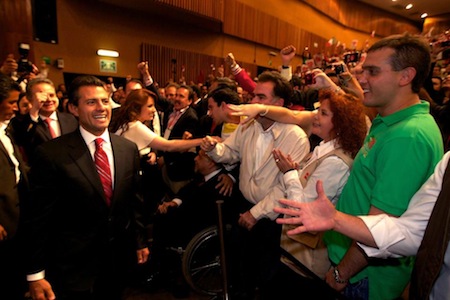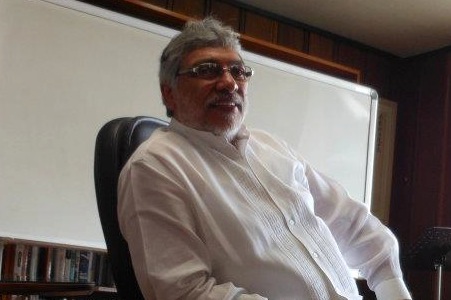
The rapid count from Mexico’s federal election institute is in, and has projected that, as expected, Enrique Peña Nieto, the candidate of the the Partido Revolucionario Institucional (PRI), has been elected the next president of Mexico.
Peña Nieto had between 37.93% and 38.55% of the vote. Andrés Manuel López Obrador, the candidate of the Partido de la Revolución Democrática (PRD), who narrowly lost the 2006 presidential election, won between 30.90% and 31.86% of the vote. The candidate of the ruling Partido Acción Nacional (PAN), Josefina Vázquez Mota, won between just 25.10% and 26.03% of the vote. As shown below in an electoral map from El Universal, the PAN still eked out a plurality in the vote in some of its strongholds in Mexico’s north, and the PRD held on to many of the states in central and southern Mexico that have long been its strongest region, while the PRI found success across the country.

López Obrador has not yet conceded defeat, however, maintaining that he will wait for the final count.
Outgoing president Felipe Calderón has promised a cooperative transition, pending final results from Mexico’s elections institute.
Meanwhile, the PRI seemed likely to win a majority in both houses of Mexico’s Congress — in particular with an absolute majority in the
The ability to control both the executive and legislative branches was seen as a major opportunity for the PRI to implement tax reforms, labor reforms and energy reforms that the PAN has not accomplished in the past 12 years of occupying Los Pinos.
Across the country, up to a quarter of Mexicans also voted in gubernatorial elections in six states and selected a new head of government in the Distrito Federal.
In the DF, the PRD’s candidate, Miguel Ángel Mancera, the current DF attorney general, won the election easily with 63.5% of the vote, extending the PRD’s longtime advantage in the DF — the party’s candidate has won the race since 1997, when Mexico City’s residents first had the opportunity to vote directly for their head of government.
In Morelos, exit polls showed the PRD’s candidate, Graco Ramírez Garrido Abreu, leading with 41% of the vote, with the PRI’s candidate, Amado Orihuela Trejo, following in second place with 37%.
In Tabasco, the PRI’s candidate, Jesús Alí de la Torre, mayor of Villahermosa, and the PRD’s candidate, federal senator Arturo Núñez Jiménez, were locked in a very tight race — exit polls show the PRI candidate leading 37.03% to 35.81%.
Although the PRI has declared victory in Yucatán, its candidate Rolando Zapata was leading with just 30.01% to the PAN’s candidate, Joaquín Díaz Mena with 28.32%. The PAN held the governorship of Yucatán previously from 2001 to 2005. Exit polls, however, showed Zapata with a more comfortable margin of victory of about 49% to 40%.
In Jalisco, Jorge Aristóteles Sandoval Díaz was set to win 44% of the vote to just 33% for the PRI’s candidate — Jalisco is Mexico’s third-largest state and has been controlled by the PAN since 1995.
In Guanajuato, however, Mexico’s fifth-largest state, and another PAN stronghold since 1995 (former president Vicente Fox got his political start here), the PAN’s Miguel Márquez Márquez, a state minister for social and human development, seems likely to have won: he leads with 49.77% to just 38.04% for the PRI candidate.
In Chiapas, the 32-year-old Manuel Velasco Coello, the PRI-allied candidate of the Partido Verde Ecologista de México (PVEM), was leading with 64.3%.
![]()






